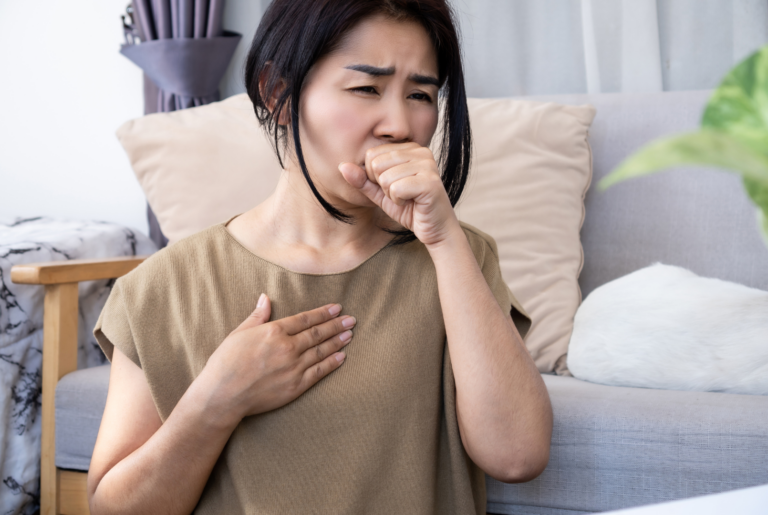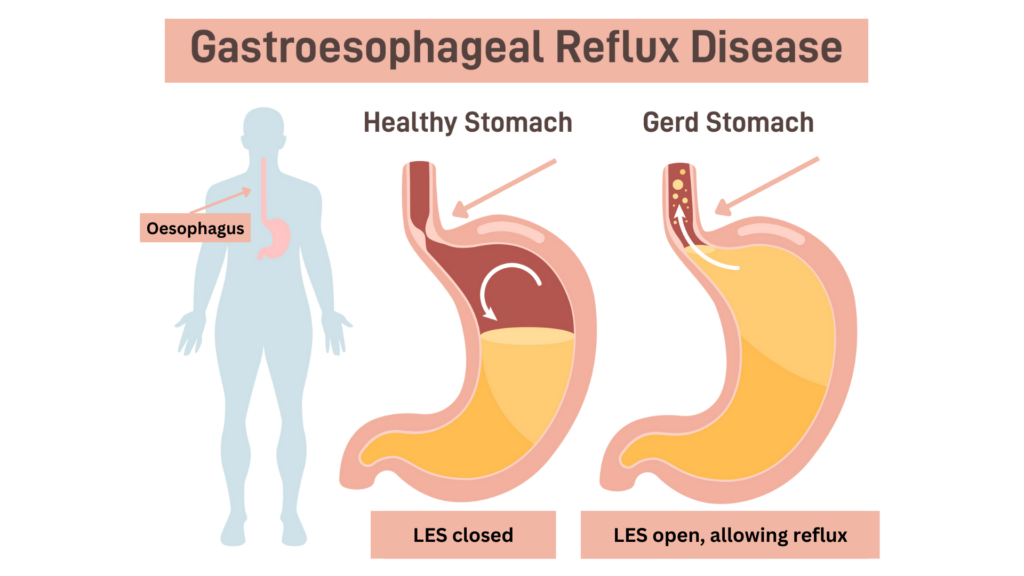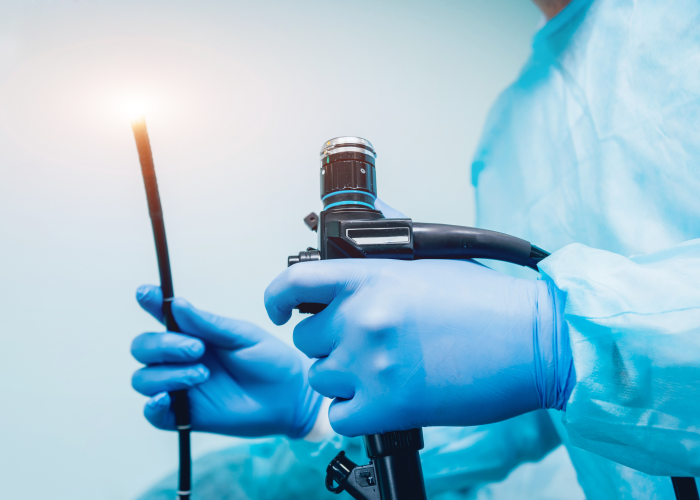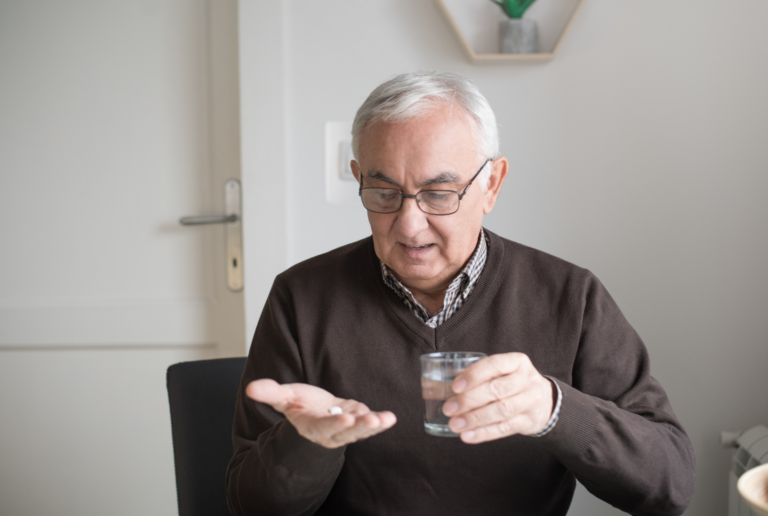
Tired of that burning feeling in your chest? Find out why heartburn happens, how to treat it, and when to see a doctor.
Originally published: May 16, 2023 | Updated: Jan 06, 2025
Heartburn: Symptoms, Causes and Effective Solutions
Table of Contents
Maybe you’ve just eaten a big meal when that uneasy, burning feeling creeps up your chest. Or maybe a strange, sour, or bitter taste has woken you up in the middle of the night.

You most likely suffer from heartburn if this sounds familiar to you. Heartburn is also known as acid reflux, acid indigestion, or gastroesophageal reflux disease (GERD).
Occasional heartburn may be brushed off as some minor issue, but it can become a daily challenge for many people.
Millions of people throughout the world suffer from heartburn, acid reflux or GERD. Over the years, the number of people suffering from GERD has increased a lot. About 442 million people had it in 1990, but by 2019, that figure had increased by 78% to almost 784 million.
Let’s discuss its causes, how to recognise the symptoms, and above all how to deal with it.
What Is Heartburn?

When stomach acid rises into the oesophagus (a 25cm long, hollow tube that joins your mouth and stomach), it is known as heartburn or acid reflux.
At the base of the oesophagus, there is a ring-shaped muscle, known as lower oesophageal sphincter (LES). This muscle acts like a valve. This valve opens to allow food to enter your stomach for digestion. It stays closed to prevent food and stomach acid from flowing back into your oesophagus.
The most common cause of heartburn is a weakened or damaged LES.
Anybody can experience acid reflux or heartburn. However, if it occurs regularly, it can result in gastroesophageal reflux disease (GERD). GERD is a more severe type of acid reflux that can harm the lining of the oesophagus.
Despite its name, heartburn involves your digestive system, not the heart.
Why Does Heartburn Happen, and Does it Happen to Everyone?
Heartburn or acid reflux can happen for many reasons, but most of the time, it’s because the LES isn’t working right.
The lower esophageal sphincter (LES) usually keeps food and acid in the stomach and stops them from moving up into the esophagus, which can cause a burning feeling in the chest.
But if the LES becomes weak or relaxes when it shouldn’t, stomach contents can rise into the esophagus and make you feel uncomfortable.
However, certain things can make you more likely to get acid reflux.

•Age
With age, the natural decrease in muscle tone causes the LES to weaken. This makes it easier for stomach acid to cause heartburn and discomfort.
Additionally, the digestive system slows down with age, meaning food stays in the stomach longer, increasing the risk of acid irritating the esophagus.
• Pregnancy
Being pregnant can make acid reflux worse, especially in the later stages. Hormonal changes cause the LES to loosen, and the growing uterus puts pressure on the stomach, pushing acid upward. This is why many women experience acid reflux during pregnancy
• Medicines
Acid reflux can worsen if you take certain medicines that relax the LES or irritate the stomach. Painkillers like aspirin, some blood pressure medicines, and medicines used to treat asthma or depression are often to blame.
• Stress
Stress doesn’t cause acid reflux itself, but it can make symptoms worse. Some people who are stressed may make more stomach acid, and they can also do things like eating too quickly or too much. Both can cause reflux.
• Some foods and drinks, large meals

Many people get acid reflux when they eat spicy foods, citrus fruits, chocolate, or coffee.
• Being overweight
Being overweight puts more stress on the stomach, which can cause acid reflux.
• Hiatal Hernia
A hiatal hernia happens when part of the stomach moves up into the chest through an opening in the diaphragm. This can make it easier for stomach acid to flow back into the oesophagus, causing acid reflux.
Heartburn Symptoms

A range of uncomfortable symptoms, from mild to severe, can be caused by acid reflux. Recognizing these symptoms early on is important for taking care of the condition and avoiding long-term damage.
1. Heartburn
One of the most common and well-known symptoms is a burning feeling, usually felt in the chest or throat after eating. , and it can be triggered by certain foods or lying down or bending over.
2. Regurgitation
Another common symptom is the feeling of stomach acid or food coming back up into the mouth. This can lead to a sour or bitter taste in the throat or mouth. Regurgitation can be more noticeable when lying down or bending over.
3. Chest Pain
Chest pain is often a sign of heart trouble but can also be a sign of acid reflux. There may be sharp or dull pain in the chest, generally behind the breastbone.
Because it may feel like a heart attack, you should be careful if you have chest pain along with other symptoms like shortness of breath or dizziness.
If the chest pain is severe or lasts for a long time, you should immediately see a doctor to rule out heart problems.
4. Trouble swallowing (Dysphagia)
Some people who have acid reflux may have dysphagia, which means they have difficulty swallowing. When the oesophagus gets swollen, it gets tricky for food and drinks to move easily from the mouth to the stomach.
It might hurt to swallow or feel like something is stuck in the throat. This can make you afraid to eat over time, making you lose weight or dehydrate if the problem isn’t fixed.
5. Other Symptoms
Along with these usual signs, acid reflux can sometimes lead to a cough that won’t go away, hoarseness, or a feeling of a lump in the throat. People who have acid reflux may also feel bloated or nauseous.
How do Doctors Test for Heartburn?
It’s important to get a correct diagnosis if you have acid reflux symptoms often. Medical tests can help confirm the problem and rule out other possible reasons for your pain.
Some of the tests used to find out if someone has GERD are:
1. Endoscopy

A bendable tube with a small camera on the end is put down your throat for an endoscopy. During this test, doctors can look at the walls of your oesophagus and stomach to see if there are any signs of damage from acid reflux, such as sores or inflammation.
It’s usually used when the symptoms are very bad or when the patient has problems like having trouble eating.
2. Oesophageal pH Test
This test checks how much acid has been in your stomach over 24 hours. A small probe is put into your oesophagus through your nose or mouth.
This probe measures how often stomach acid touches your oesophagus. This test is often used to find out if someone has GERD (Gastroesophageal Reflux Disease), especially when medicine doesn’t help their symptoms.
3. Esophageal manometry
This test measures how your esophageal muscles contract. This test helps figure out how well the LES is working. Acid reflux is more likely to happen if the LES is too weak or doesn’t close properly.
Manometry is sometimes done along with pH tracking to get a fuller picture of how the oesophagus works.
How To Treat Acid Reflux?
1. Lifestyle Changes
Managing acid reflux effectively often requires making some changes to your lifestyle. While medications can help relieve symptoms, adopting healthier habits can play a key role in preventing flare-ups and improving overall well-being.
• Dietary Changes

One of the most effective ways to manage acid reflux is by avoiding foods that trigger symptoms. Common trigger foods include spicy dishes, fatty and fried foods, citrus, chocolate and caffeine.
Keeping track of what causes your symptoms and eliminating these foods from your diet can greatly reduce the chances of acid reflux. Eating smaller meals throughout the day, rather than large, heavy meals, can also help keep stomach acid in check.
• Meal Timing

The timing of your meals can also impact acid reflux. Avoid eating large meals late at night or right before going to bed. This is because lying down after eating can cause the stomach acid to flow back into the oesophagus more easily.
Aim to finish your last meal at least 2-3 hours before you lie down or go to bed.
• Weight Management
Being overweight or obese puts extra pressure on the stomach, increasing the likelihood that acid will back up into the oesophagus. Maintaining a healthy weight through regular physical activity and a balanced diet can help reduce this pressure and prevent acid reflux symptoms.
Even losing a small amount of weight can make a significant difference.
• Other Habits
Besides dietary changes, consider other habits like not wearing tight clothing around the abdomen, which can increase pressure on the stomach.
Elevating the head of your bed can also help prevent nighttime acid reflux by keeping stomach acid from rising while you sleep.
2. Medicines

When lifestyle changes like diet or exercise don’t fully relieve acid reflux, certain medicines can help control the symptoms. These medicines work in different ways to manage heartburn, acid regurgitation, and other common acid reflux symptoms.
Antacids
Antacids are often the first choice for treating mild acid reflux. They work by neutralizing stomach acid, giving quick relief from heartburn. Over-the-counter options like Tums or Maalox are widely available. While antacids can offer fast relief, they don’t fix the root causes of acid reflux and provide only temporary relief.
H2 Blockers
H2 blockers, such as Zantac (ranitidine) or Pepcid (famotidine), reduce the acid your stomach produces. These medicines work longer than antacids and are helpful for more persistent symptoms. While they don’t act as quickly as antacids, they’re helpful for managing acid reflux throughout the day and night.
Proton Pump Inhibitors (PPIs)
Proton pump inhibitors (PPIs) are among the most effective medicines for treating acid reflux and GERD. PPIs like Prilosec (omeprazole) and Prevacid (lansoprazole) work by stopping the stomach from producing too much acid.
These medicines are often used for severe cases of acid reflux and offer long-lasting relief. PPIs are available both over-the-counter and by prescription, depending on the dosage needed.
Other Medicines
For people with severe acid reflux that doesn’t respond to other treatments, doctors may recommend additional medicines. Prokinetics, for example, helps strengthen the lower oesophageal sphincter (LES) to prevent acid from escaping into the oesophagus.
In some rare cases, surgery might be recommended if other treatments don’t work.
3. Surgery
Surgery is an option for people with GERD who don’t improve with lifestyle changes and medication or who wish to stop taking long-term medications.
Because GERD is caused by dysfunction of the lower oesophageal sphincter—a ring of muscles acting as a valve between the stomach and the oesophagus, which is the tube that carries food from the mouth to the stomach—surgery is designed to reinforce and strengthen the oesophageal sphincter.
This enables it to function correctly, ensuring the valve stays closed and not allowing acid and other stomach contents to flow into the oesophagus.
Among other types, the most common surgery for GERD is Laparoscopic Nissen Fundoplication.
The surgery strengthens the lower oesophageal sphincter, preventing stomach acid from flowing into the oesophagus.
When to See a Doctor?
While occasional acid reflux is common, it’s important to recognize when symptoms are more serious and may require medical attention. If left untreated, acid reflux can lead to complications that significantly affect your quality of life and health.
Persistent or Worsening Symptoms
If you experience acid reflux and heartburn more than twice a week, or if the symptoms become more severe, it’s time to consult a doctor.
Prolonged discomfort, especially if it doesn’t respond to over-the-counter medications, may indicate a more serious condition like GERD (Gastroesophageal Reflux Disease), which requires professional care.
Over time, untreated acid reflux can cause damage to the oesophagus, leading to complications like oesophageal ulcers, bleeding, or narrowing of the oesophagus (called strictures).
Barrett’s esophagus is another serious issue where the lining of the esophagus changes, which makes esophageal cancer more likely.
Other symptoms
If you notice any of the following signs, you should seek medical help:
- Difficulty swallowing
- Regurgitation of food or sour liquid
- Chest pain, especially when accompanied by shortness of breath (which could also be a sign of heart problems)
- Unexplained weight loss
- Persistent coughing or hoarseness that doesn’t improve
- Frequent nausea or vomiting
Conclusion
Managing heartburn, acid reflux, GERD effectively starts with understanding the condition and knowing how to prevent and treat it. In this article, we’ve discussed the common causes, symptoms, and various methods of diagnosing, managing and treating this condition.
While many people find relief with simple changes in diet and habits, it’s crucial to recognize when more advanced treatments or professional medical help are needed.
If you experience frequent acid reflux symptoms, don’t wait for them to worsen. Seeking help early can prevent the condition from progressing into GERD or causing significant damage to the oesophagus.
Consulting a healthcare provider for personalized advice and treatment options is essential for managing acid reflux effectively and preventing long-term complications.
Disclaimer
The content on this website is intended for informational purposes only and is not a substitute for professional medical advice, diagnosis, or treatment. Always seek guidance from a qualified healthcare provider or licensed medical professional before changing your medications, diet, exercise, or health routine.
References
https://pmc.ncbi.nlm.nih.gov/articles/PMC9122392/; Global, regional and national burden of gastroesophageal reflux disease, 1990–2019: update from the GBD 2019 study; Ann Med.2022 May 17;54(1):1372–1384. doi: 10.1080/07853890.2022.2074535; accessed Jan 04, 2025
https://www.niddk.nih.gov/health-information/digestive-diseases/acid-reflux-ger-gerd-adults; Acid Reflux (GER & GERD) in Adults; accessed Jan 04, 2025
https://aci.health.nsw.gov.au/networks/eci/clinical/ed-factsheets/gastro-oesophageal-reflux-disease; accessed Jan 04, 2025
https://www.hopkinsmedicine.org/health/conditions-and-diseases/gastroesophageal-reflux-disease-gerd#:~:text=24%2DHour%20pH%20Impedance&text=Your%20doctor%20places%20a%20thin,a%20period%20of%2024%20hours; GERD Diagnosis; accessed Jan 04, 2025
https://medlineplus.gov/heartburn.html; Heartburn; accessed Jan 04, 2025
https://medlineplus.gov/lab-tests/esophageal-ph-test/; Esophageal pH Test; accessed Jan 04, 2025
https://www.hopkinsmedicine.org/health/treatment-tests-and-therapies/gastroesophageal-reflux-disease-gerd-treatment; Gastroesophageal Reflux Disease (GERD) Treatment; accessed Jan 04, 2025
https://www.hopkinsmedicine.org/health/treatment-tests-and-therapies/gastroesophageal-reflux-disease-gerd-treatment; Gastroesophageal Reflux Disease (GERD) Treatment, accessed Jan 04, 2025
https://stanfordhealthcare.org/medical-treatments/l/laparoscopic-nissen-fundoplication.html; Laparoscopic Nissen Fundoplication; accessed Jan 04, 2025





